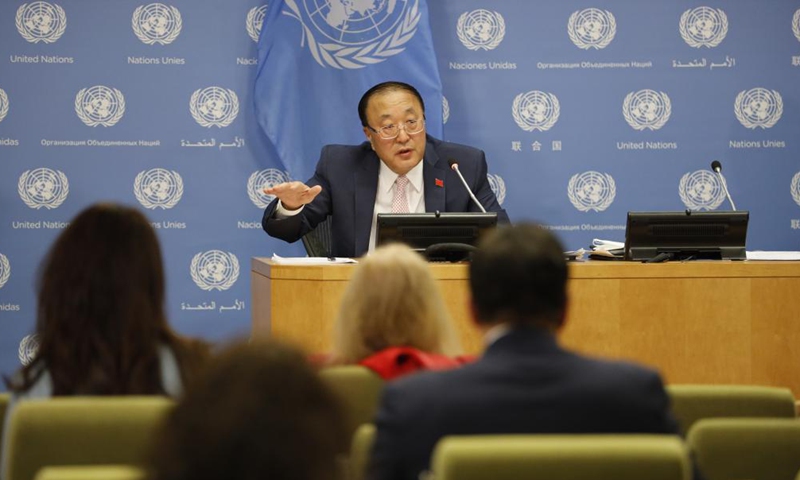China's ambassador to the United Nations Zhang Jun criticized the US for using the Korean peninsula issue as a card for its "Indo-Pacific strategy," after China and Russia vetoed a US-led UN Security Council resolution to toughen sanctions on North Korea over its intercontinental ballistic missile (ICBM) launches, the first time since 2006.
Zhang said the US' one-sided emphasis on sanctions will not only escalate confrontation, but also cause humanitarian problems. Experts said the US' move is a continuation of the recent intensive manipulation of the Indo-Pacific issue. Instead of concerning itself with nuclear issues, the US' real purpose is to stigmatize Pyongyang through sanctions, but also to try to discredit China's image as a responsible power.
The US-drafted resolution, which received support from 13 other Security Council members, includes reducing the amount of oil that North Korea can import and banning tobacco to the country, media reported.
US ambassador to UN Linda Thomas-Greenfield said Pyongyang's missile launch poses a "threat to the peace and security" of international society, noting that Washington would impose additional sanctions against North Korea.
According to China's Permanent Mission to the UN, Thomas-Greenfield has leveled a slew of accusations against China's position, while US media said Thomas-Greenfield has expressed disappointment.
In the vote explanation sector, Zhang said China has been calling on all parties to exercise calm and restraint, and to desist from actions that could increase tensions and lead to miscalculations, considering the Council has adopted 10 sanction resolutions against North Korea with "the harshest and the most complex sanctions regime" established since 2006, Pyongyang's first nuclear test explosion.
Zhang suggested that it is the US that should be blamed for the current situation, saying the the crux of the matter is whether or not someone wants to use the Korean peninsula issue as a card for its so-called Indo-Pacific strategy.

Chinese Ambassador to the United Nations (UN) Zhang Jun speaks during a press conference at the UN headquarters in New York, the United States, on May 3, 2021. Photo:Xinhua News Agency
The US has been hypocritical and insidious in its dealings with North Korea in the past three decades since the end of the Cold War. The threat from the US is the root cause of North Korea's nuclear and missile tests, a Beijing-based international affairs expert who requests anonymity, told the Global Times on Friday.
He said US President Joe Biden's recent Asia tour not only targeted China but also North Korea, escalating regional tensions and made the COVID-hit Pyongyang "feel threatened."
During the visit last week, Biden and South Korean President Yoon Suk-yeol agreed on a wide range of measures including the reincarnation of an extended deterrence body. And they also visited a missile-tracking command post.
On Wednesday,
the US and South Korea jointly fired two missiles in response to North Korea's reported launch of three missiles, marking a further escalation of the Korean Peninsula situation.
In 2018, North Korea took a series of measures to denuclearize and de-escalate the situation, and the leaders of the North Korea and the US met in Singapore, where they reached important consensus on establishing a new type of relations, including a peace mechanism on the peninsula, and advancing the denuclearization process on the peninsula.
"Regrettably, the US did not reciprocate North Korea's positive initiatives in accordance with the action-for-action principle," Zhang said.
The ambassador said that if some people are making other plans deep down to spread the flames of war to Northeast Asia, to the Korean peninsula, then China would have no choice but to take stern and firm initiatives to defend the peace and stability of the Korean peninsula and that of Asia Pacific.
As early as February this year, Ambassador Zhang called on the international community to seriously consider how to take measures to improve the design and implementation of Security Council sanctions and reduce the negative impact. He said UN Security Council Resolution 2397 has caused serious humanitarian consequences since its adoption, severely restricting North Korea's import of livelihood goods, causing severe food shortages and backward medical conditions.
Lü Chao, an expert on the Korean peninsula issue at the Liaoning Academy of Social Sciences, told the Global Times on Friday that by proposing sanctions, the US aimed at putting the blame for escalating tensions on North Korea. But the US has never eased its blockade of North Korea.
The US deliberately put forward the sanctions proposal, aiming to create the illusion of "China and Russia conniving at North Korea" so as to increase the "rationality" to contain China by discredit China's image as a responsible great power.
Washington does not really care about the nuclear issue in North Korea. What it cares about is to manipulate the issue to further serve its interest in its confrontational Indo-Pacific framework, Lü said.




